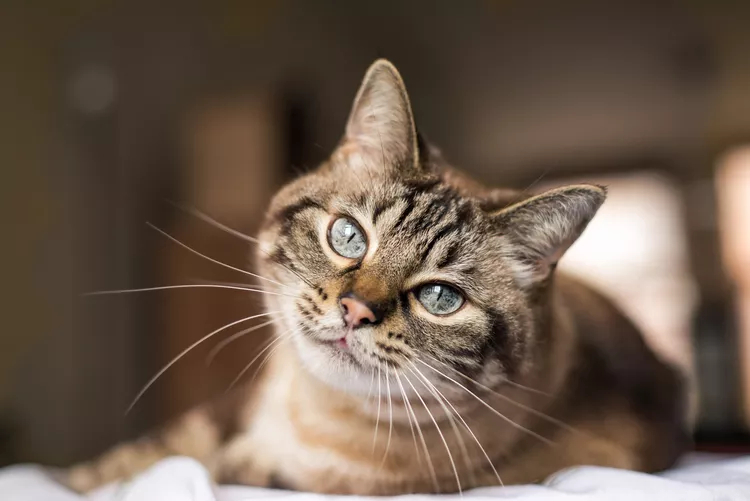What Do Cats Think About?

Have you ever wondered what cats think about? Cats spend a lot of their time lying around, relaxing, and snoozing. What do cats think about (or dream about) when they’re lying like lumps in a patch of autumn sunshine? What about when your cat is sitting on your chest and staring at you with those mysterious eyes? Outside of the typical meandering around the house, strolling to check out the food bowl, and a few bursts of intense activity (evening zoomies are always entertaining), cat don’t do much most of the day.
They must be thinking about something all day, but what?
Studies About Cat Cognition
Though there is still a lot to learn about how cats think, a number of studies have explored cat behavior and feline cognition, including memory, how cats perceive things, how well they understand human social cues, attachment bonds, and more. We know that our cats love us and feel comfortable with us. For instance, cats respond more to their owner’s familiar voice than that of a stranger, and cats even look to us for reassurance when they are worried or unsure about something new.
What Your Cat Thinks About You
As it turns out, cats might view us humans as clumsy, oversized cats who don’t always act the way cats might expect. John Bradshaw, who wrote the book Cat Sense: How the New Feline Science Can Make You a Better Friend to Your Pet (2013), came up with this theory.
Bradshaw, who has extensively studied the history of domesticated cats, as well as the interactions between people and animals, says in his book that cats’ behavior toward humans is indistinguishable from their behavior toward other cats. For instance, cats will walk toward their owners with their tails straight up in the air and rub up against us, exactly in the same manner as a cat would approach another cat in a friendly greeting. Cats even lick their humans to groom them, much like they do with other cats.
In short, your cat sees you as a huge cat-like creature who walks on two legs, inexplicably wears clothing, and often does odd things. Your cat could be wondering what strange and entertaining thing you might do next.
Cat Facial Expression and Body Language
We might never know exactly what a cat is thinking, but it’s possible to get a pretty good idea of what they are feeling by learning to read feline facial expressions. Unfortunately, a recent study found that reading cat facial expressions is pretty hard for most people to do. If you’re wondering how you might do, take a cat faces interactive quiz here.)
Learning to read cat body language is another skill you can employ to try to get inside your cat’s head. This is somewhat easier than learning to read cat facial expressions. Understanding what certain feline postures and body movements mean can shed a lot of light on what’s going on inside your cat’s head.
For example, some of the signs that a cat is feeling calm and at peace include a relaxed body, ears in a relaxed and neutral position (not drawn back), and whiskers in a relaxed position, with the pupils of the eyes appearing as small slits. Signs that a cat is feeling mildly stressed include a stiff body, head turned away, body leaning back or crouched low to the ground, whiskers extended forward, and pupils slightly dilated.
Body language that indicates a very stressed, anxious or frightened cat include: ears turned backward or folded flat against the head, tail low, body crouched very flat to the ground, hair standing up on the body and tail (possibly with an arched back), and the pupils of the eyes very dilated. A very scared or aggressive cat may also hiss, spit, growl, and swat with her claws.
Get Inside Your Cat’s Head
Even if you never know for sure what your cat is thinking about, it can be fun to envision what might be going on inside its mysterious mind. The next time you see your cat, take note of its facial expression and body language, and try to imagine what it might be thinking. For all you know, your cat simply thinking about how much it loves you.